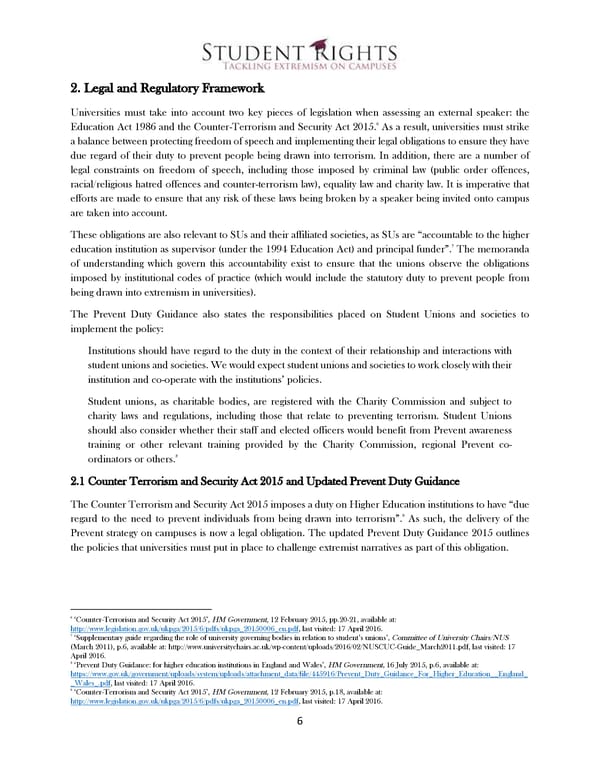! 2. Legal and Regulatory Framework Universities must take into account two key pieces of legislation when assessing an external speaker: the 6 Education Act 1986 and the Counter-Terrorism and Security Act 2015. As a result, universities must strike a balance between protecting freedom of speech and implementing their legal obligations to ensure they have due regard of their duty to prevent people being drawn into terrorism. In addition, there are a number of legal constraints on freedom of speech, including those imposed by criminal law (public order offences, racial/religious hatred offences and counter-terrorism law), equality law and charity law. It is imperative that efforts are made to ensure that any risk of these laws being broken by a speaker being invited onto campus are taken into account. These obligations are also relevant to SUs and their affiliated societies, as SUs are “accountable to the higher education institution as supervisor (under the 1994 Education Act) and principal funder”.7 The memoranda of understanding which govern this accountability exist to ensure that the unions observe the obligations imposed by institutional codes of practice (which would include the statutory duty to prevent people from being drawn into extremism in universities). The Prevent Duty Guidance also states the responsibilities placed on Student Unions and societies to implement the policy: Institutions should have regard to the duty in the context of their relationship and interactions with student unions and societies. We would expect student unions and societies to work closely with their institution and co-operate with the institutions’ policies. Student unions, as charitable bodies, are registered with the Charity Commission and subject to charity laws and regulations, including those that relate to preventing terrorism. Student Unions should also consider whether their staff and elected officers would benefit from Prevent awareness training or other relevant training provided by the Charity Commission, regional Prevent co- 8 ordinators or others. 2.1 Counter Terrorism and Security Act 2015 and Updated Prevent Duty Guidance The Counter Terrorism and Security Act 2015 imposes a duty on Higher Education institutions to have “due 9 regard to the need to prevent individuals from being drawn into terrorism”. As such, the delivery of the Prevent strategy on campuses is now a legal obligation. The updated Prevent Duty Guidance 2015 outlines the policies that universities must put in place to challenge extremist narratives as part of this obligation. !!!!!!!!!!!!!!!!!!!!!!!!!!!!!!!!!!!!!!!!!!!!!!!!!!!!!!!!!!!!! 6 ‘Counter-Terrorism and Security Act 2015’, HM Government, 12 February 2015, pp.20-21, available at: http://www.legislation.gov.uk/ukpga/2015/6/pdfs/ukpga_20150006_en.pdf, last visited: 17 April 2016. 7 ‘Supplementary guide regarding the role of university governing bodies in relation to student’s unions’, Committee of University Chairs/NUS (March 2011), p.6, available at:!http://www.universitychairs.ac.uk/wp-content/uploads/2016/02/NUSCUC-Guide_March2011.pdf, last visited: 17 April 2016. 8 ‘Prevent Duty Guidance: for higher education institutions in England and Wales’, HM Government, 16 July 2015, p.6, available at: https://www.gov.uk/government/uploads/system/uploads/attachment_data/file/445916/Prevent_Duty_Guidance_For_Higher_Education__England_ _Wales_.pdf, last visited: 17 April 2016. 9 ‘Counter-Terrorism and Security Act 2015’, HM Government, 12 February 2015, p.18, available at: http://www.legislation.gov.uk/ukpga/2015/6/pdfs/ukpga_20150006_en.pdf, last visited: 17 April 2016. 6! !
 A Model External Speaker Policy Page 7 Page 9
A Model External Speaker Policy Page 7 Page 9